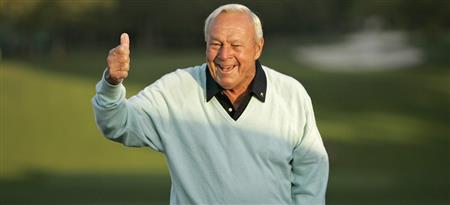 |
| (http://www.sailingscuttlebutt.com/2016/09/26/remem ) |
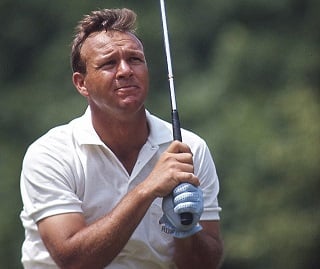 |
| (http://www.golf.com ) |
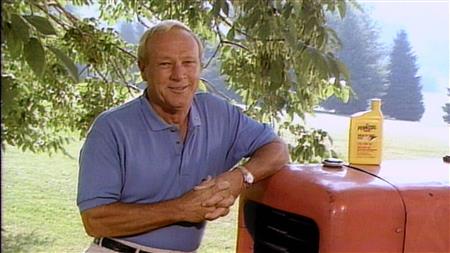 |
| (www.golfchannel.com ) |
Palmer was more than just a great golfer. He worked hard to develop several golf-related businesses and was even more financially successful through his businesses and entrepreneurship than he was playing golf. Palmer was the owner of a successful golf course design company. Martin Sherwin wrote "He established the Florida-based Palmer Course Design Company. Palmer's company built courses throughout the United States as well as in Italy, Australia, Ireland, Japan, Korea, Malaysia, and, in 1984, the first golf course in the People's Republic of China" (Sherwin). Palmer got his start at building courses when he and his college teammates planted greens at Wake Forest. Later while serving in the Coast Guard, he designed and built his first 9 hole golf course between air strips. He probably didn't realize at the time that this was the start of a profitable business venture years later. Palmer always wanted to make golf a more popular sport. One way he did this was by creating the Golf Channel. "In 1995, he teamed up with TV and media entrepreneur Joseph E. Gibbs to launch the Golf Channel, the success of which as a forum for instruction, debate, entertainment and tournament coverage has, more than two decades later, exceeded all its distinguished founders' initial expectations" (Arnold Palmer: Kingdom Magazine). The Golf Channel helped change the sport of golf and increased the amount of viewers. Although he had success with the Golf Channel and course design, most of his financial success came from endorsements. "He became one of the sports world's all-time greatest pitchmen. By the late 1990s, it was reported that he was taking in more than $20 million in endorsement deals annually" (Biography.com). He used his personality and his success in golf to market himself to make money. Palmer is best known for representing brands like Penzoil and Hertz rental car as well as the ice tea and lemonade drink named after him. Through hard work and an entrepreneurial spirit, Palmer's financial success from the Golf Channel, designing golf courses, and his endorsements created a net worth of $675 million in 2015 (Arnold Palmer: Kingdom Magazine).
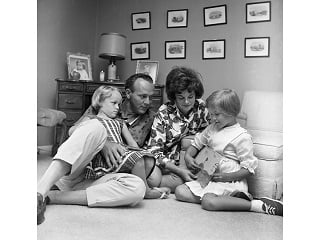 |
| (www.golfchannel.com) |
Although best known for his golf skills, one of Palmer's most heroic traits is the way he treated those around him. Palmer wrote about his views on family "When I was growing up, nothing was more important than golf, but that's the attitude of a young person who hasn't a care in the world. Later on I figured it out. Family was first. Always. Then golf and business come after" (Palmer 180). Palmer's own parents were great examples of focusing on family. Later as a husband and father, Palmer always made his family a priority. Palmer was married to his wife, Winnie, for 45 years before she died of cancer. When she died, Palmer knew Winnie would want him to help other people. Kingdom Magazine describes Palmer's actions shortly after Winnie's death. "Even though Palmer was hit hard by the death from ovarian cancer of his beloved Winnie... Palmer's sorrow propelled him to step up his already extensive charitable activities. He had founded the Arnold Palmer Hospital for Children in Orlando in 1989. shortly after her death he opened the Winnie Palmer Hospital for Women & Babies" (Arnold Palmer: Kingdom Magazine). Palmer and his wife were committed to helping others especially women and children. They donated their own money as well as helped to raise additional funds through their charities and foundations and helped to establish multiple hospitals, cancer centers and even a nature preserve. Palmer was also known for how he treated both fans and fellow players on the course. In A Golfer's Life, Palmer wrote about one of his first tournaments as a kid. After a bad putt, he showed his anger by throwing his club and yelling. Although he won the tournament, his father was not happy and spent the drive home teaching him a lesson about sportsmanship, "Learning to be a gracious loser is at least as important as being a gracious winner. Being an ungracious winner was perhaps the worst thing he could imagine" (Palmer and Dodson 46). This early lesson on sportsmanship stayed with Palmer throughout his professional career and at the end of a tournament he was always a gracious winner or loser. He showed this same graciousness to his fans by always taking the time to sign an autograph or take a picture. Palmer showed his character by the way he treated his family, fans, competitors and the people he helped through his charities.
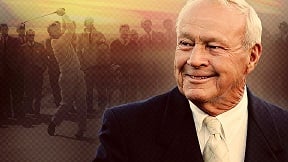 |
| (www.espn.com) |
Palmer became a hero through determination and perseverance, working hard to be better, and by showing love to people around him. Palmer did not always have it easy, but through hard work and determination on and off the greens he found success. He always had the will to be better and kept improving his game, character, and the world. If I can work hard and have an attitude like Arnold Palmer, I know I can find success too.
Works Cited
"Arnold Palmer: A Remarkable Life - Kingdom Magazine." Kingdom Magazine, TMC USA, 6 Dec. 2016, kingdom.golf/features/arnold-palmer-a-remarkable-life/. Accessed 4 May 2017.
"Arnold Palmer." Biography.com, A&E Networks Television, 26 Sept. 2016, www.biography.com/people/arnold-palmer-9432357. Accessed 5 May 2017.
Palmer, Arnold, and James Dodson. A Golfer's Life. London, Arrow, 2000.
Palmer, Arnold. Arnold Palmer: a Life Well Played: My Stories. New York, St. Martin's Press, 2016.
Sherwin, Martin. "Arnold Palmer." The Scribner Encyclopedia of American Lives, Thematic Series: Sports Figures, edited by Arnold Markoe and Kenneth T. Jackson, Charles Scribner's Sons, 2002. Biography in Context, link.galegroup.com/apps/doc/K3436500448/BIC1?u=powa9245&xid=624141f7. Accessed 4 May 2017.
Page created on 5/17/2017 12:00:00 AM
Last edited 5/17/2017 12:00:00 AM
